- 1983
-
The Taiwan Society of Clinical Pathology (TSCP) can trace its origins back on October 5th, 1983, when the development of the society was initiated but the official document was pended for five years until September 1988. Beforehand, the gathering of clinical pathologists from different disciplines which had been trained in the United States had begun few years earlier to get together academically in such a way that in 1986 thirteen clinical pathologists were certified by the Taiwan Society of Anatomical Pathology on behalf of the Ministry of Health. On November 27th-30th, 1987, there was the International Symposium on Clinical Pathology as a subdivision of the Society of Anatomical Pathology of the Republic of China.

- 1988
-
We have indeed come a long way since the birth of our society in 1988. From the original group of 13 idealistic clinical pathologists with common conviction for the teaching, research, and practice of laboratory medicine, we now grow to almost 200 members. In 2006, we renovated the society by sufficing Laboratory Medicine to Clinical Pathology to accommodate the Asian Society of Clinical Pathology. We reset our beloved society with the new official name: “Taiwan Society of Clinical Pathology and Laboratory Medicine” since then.
The first Taiwan Society of Clinical Pathology (TSCP) congress was inaugurated at the National Taiwan University Hospital by the late Professor Jui-San Chen (陳瑞三), the charter president from 1988 through 1994. Proceeding with the precedent clinical pathology certification in 1986, the society took over the duty and responsibility.
- 1992
-

The second Asian Society of Clinical Pathology (ASCP) congress 1992 in Cheju, Korea. - 1994
-
He successfully organized the third congress of Asian Society of Clinical Pathology (ASCP), which was held on June 23rd-25th, 1994 at the Grand Hotel, Taipei, Taiwan. This activity attracted numerous clinical pathologists around the Asian countries particularly from Japan and Korea. That was an eye-catching milestone in our history and thanks to his hard work and dedication, this congress greatly increased the credibility, visibility and acquired a great impact as a whole.

-
During his presidency, he had several international quality control-related symposiums and had the urine screening in the school children program under the auspice of the Ministry of Health. The conclusion was presented on June 18th, 1995 during the 8th International Symposium on quality control in Kobe, Japan.

The 8th International Symposium on quality control 1995 in Kobe, Japan. In conclusion, he, who is high command of Japanese, was the first president of the society, and clearly acted as the trailblazer for the advancement.
- 1994
-
Prof. Chien-Feng Sun (孫建峰) served as the second president from 1994 to 2000.
- 1996
-

The fourth ASCP congress 1996 in Yogjakarta, Korea. - 1998
-

The Quality Assurance Symposium at Taipei Veterans General Hospital on October 31st, 1998 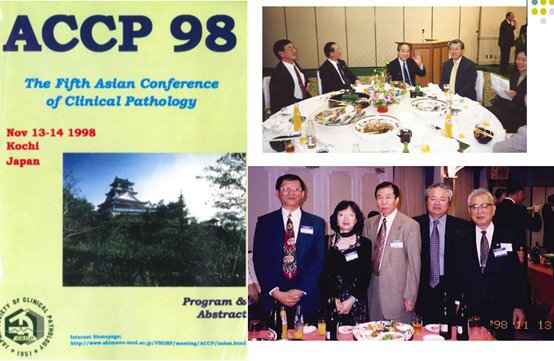
He also brought a group of speakers attending the fifth congress of ASCPaLM at Kochi, Japan, and the sixth one at Busan, Korea, respectively when he served as the president of the Asian Society of Clinical Pathology and Laboratory Medicine.

He was an exemplary model of the oriental scholar who always maintains an impartiality attitude. He, therefore, is recognized as one of those spiritual leaders.
- 2000
-
Prof. Jang -Hwa Lee (李正華) was elected as the third president from 2000 through 2006. During his tenure, he successfully organized the seventh congress of ASCP, which was held on December 6th-9th, 2002 at the Grand Hi-Li Hotel, Kaohsiung, Taiwan. We were honored to have in attendance, Prof. Jocelyn Hick from USA, Prof. Norifumi Tatsumi from Japan, Prof. Han-Ik Cho from Korea, and Prof. Nadjwa Zamalek Dalimoenthe from Indonesia to offer their best wishes for the success of the activity.

First line from left to right: Jang -Hwa Lee, Jocelyn Hick, Han-Ik Cho, Norifumi Tatsumi, Nadjwa Zamalek Dalimoenthe 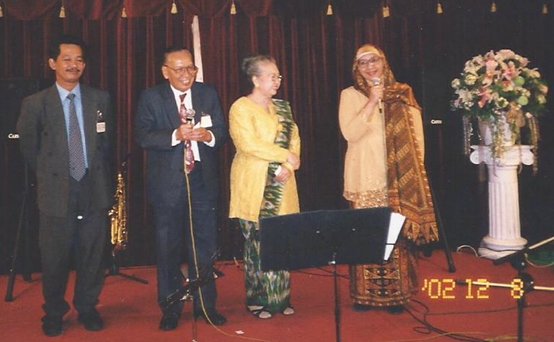
Indonesian Delegates - 2006
-
In addition, he also brought a group of speakers attending the ninth congress of ASCPaLM 2006 at Kobe, Japan. This expedition was so critical for us to add Laboratory Medicine to the back of Clinical Pathology. We followed suit.
Dr. Lee had a character as unique unassuming personality.
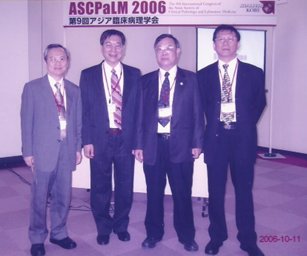
ASCPaLM 2006 at Kobe, Japan - 2006
-
Prof. Tjin Shing Jap (葉振聲) was elected in November 2006 through 2012 as the fourth president. He developed the society’s website in English. Furthermore, he was also fond of the accreditation-related programs by inviting Prof. Yun-Sik Kwak, the commissioner of CAP accreditation in East Asia to give the guidance of inspection.

Celebration of 20th anniversary in 2008. - 2010
-
In addition, he also led a group of speakers attending the eleventh congress of ASCPaLM 2010 at the Kempenski Hotel, Jakarta, Indonesia.
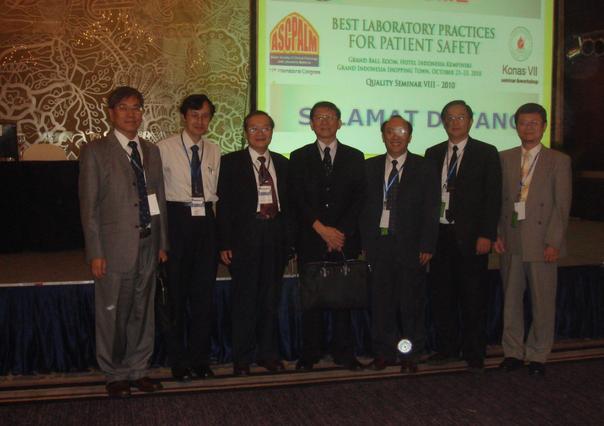
As his seniority, he also served as the president of the Asian Society of Clinical Pathology and Laboratory Medicine from 2014-2016. In his own right, he is widely acknowledged as a pioneer in studying the monogenic diseases in the fields of endocrinology and metabolism in Taiwan.
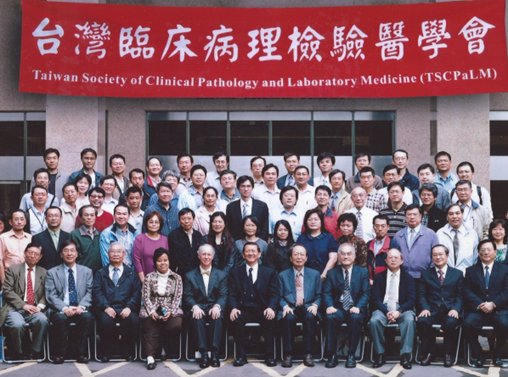
Annual General Meeting on November 21st, 2010 - 2011
-
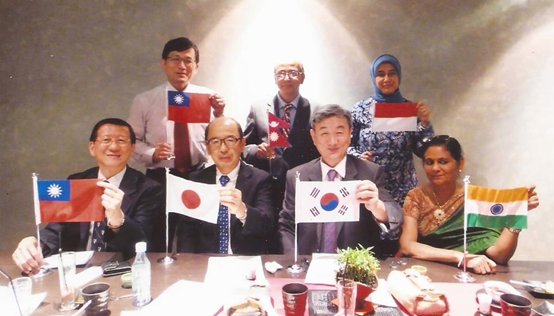
The executive Board meeting of ASCPaLM on November 20th, 2011 in Taipei - 2012
-
Prof. Jang-Ji Lu (盧章智) held the fifth presidency (2012 to 2018). During his presidency, he successfully organized the 14th ASCPaLM congress, which was held on September 20th-24th, 2016 at the National Taiwan University Convention Center, Taipei.

The 28th WASPaLM2015, Cancun, Mexico - 2016
-

The ASCPaLM Congress on September 21st, 2016 in Taipei, Taiwan - 2018
-

2018 The Annual General Meeting 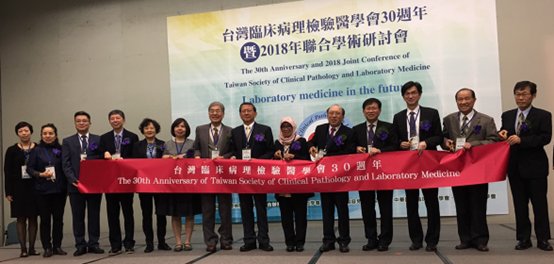
Celebration of 30th Anniversary in 2018. A year ago, in 2017, we set up the ad-hoc preparation committee for the thirty-year anniversary to oversee the whole activity, particularly seeking on the appropriate speakers and other memorabilia in general. Finally, we successfully had a 2-day comprehensive convention at the Taipei International Convention Center on December 15th-16th, 2018 by joint-venture with the other societies and attracted a great number of domestic and international high-profile scholars’ active participation. Thanks to his effort, it had greatly built a harmonious relationship among the diverse disciplines with different interests in this convention. This activity was a resounding success.
He also organized a group of speakers attending the 15th ASCPaLM congress in 2018 at UlanBator, Mongolia.
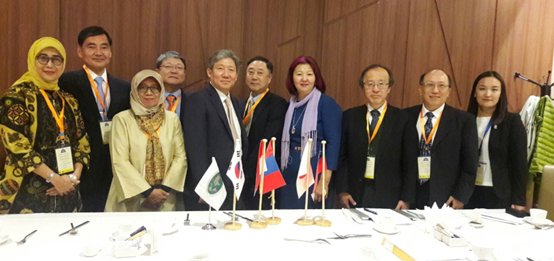
The 15th ASCPaLM Congress in 2018 at UlanBator, Mongolia. In addition to his administrative skills, he is also one of the prominent microbiologists in Taiwan who had comprehensively studied the whole genome in a drug-resistance microorganism.
- 2019
-
During the COVID19 pandemic, Prof. Puo-Ren Hsueh (薛博仁), the respected microbiologist, the right person taking the right job at the right time, was elected from 2019 to 2022. During his tenure as the sixth president, he launched numerous COVID-19 related lectures, and symposiums.
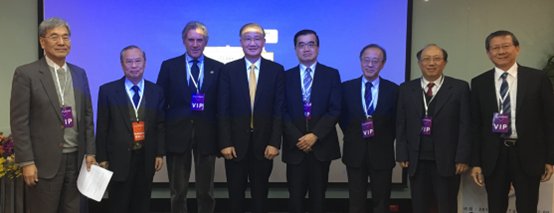
The Annual General Meeting (AGM) 2019 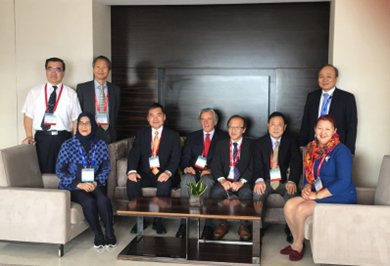
The 30th WASPaLM congress 2019 in Xian, China 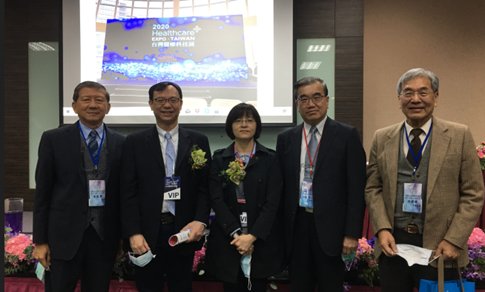
Annual General Meeting December 2019 In addition, he also attended the sixteenth virtual congress of ASCPaLM 2021, Indonesia. In conclusion, he was a charismatic leader who could marshal a wide spectrum of people from different walks of life to get together to make events happen.
- 2022
-
The current President Prof. Fang-Yeh Chu (朱芳業) just bear the office at the beginning of 2022. He re-scheduled the Society’s agenda by allotting the function of each committee. He had launched the midyear symposium on the current development of autoimmunity and autoinflammatory syndrome and is going to arrange the annual general meeting with “Frontier in Clinical Applications of Liquid Biopsy and Next-Generation Sequencing” in December, 2022.
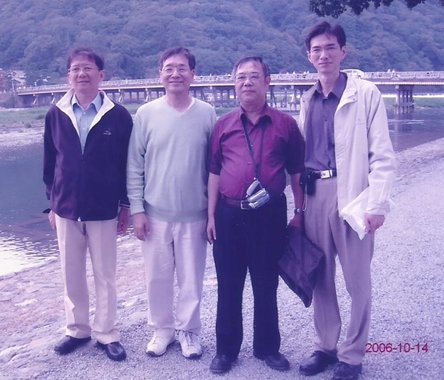
All the presidents in-a-row on October 14th, 2006, Kyoto, Japan 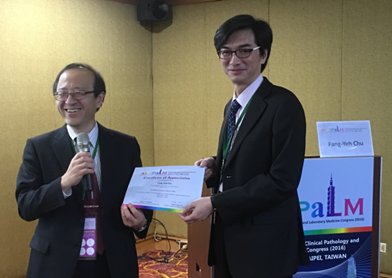
Prof. Hiyato Miyachi, Prof. Fang-Yeh Chu
In summary, major advances in laboratory measurement, microorganism detection, automation, accreditation, precision medicine, immunology, and transfusion medicine had experienced a challenge in the field of clinical pathology and laboratory medicine. However, we also should remember that a high number of theories and practices that we have been doing in the laboratory by the precedents, still provide the essential guidance to us in the laboratory today and will be a legacy to posterity in the future.